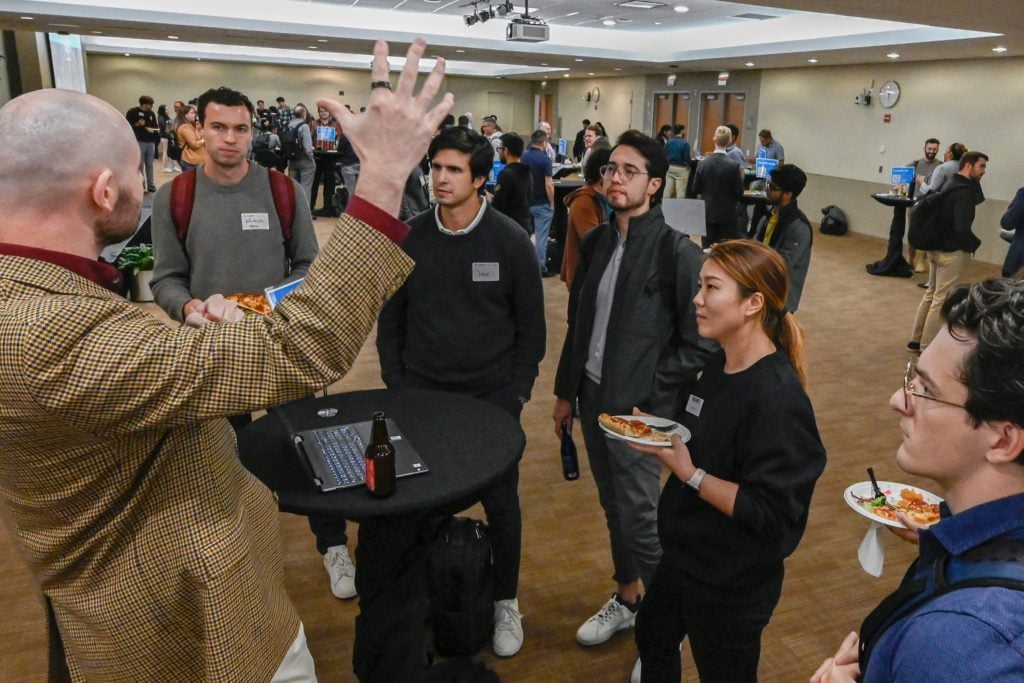Fall 2025 Collaboratorium Connects Researchers and Business Expertise

People participate in the Fall 2024 Collaboratorium at the Harper Center at University of Chicago.
Connecting researchers and scientists with business expertise, the Fall 2025 Collaboratorium will feature teams participating in the Polsky I-Corps program in addition to startups from other areas of the University, supported by the Polsky Center.
A great opportunity for Booth students, other graduate students, post-doctoral scholars, alumni, and faculty to connect, the program includes an opportunity for scientists and researchers to pitch as well as network with students about their cutting-edge research and technologies.
>> Register for the Collaboratorium: Thursday, October 2, 2025 |5:00 p.m. – 7:30 p.m.
The Collaboratorium provides the opportunity for scientists and researchers who want to explore commercialization opportunities to showcase their work and network with students and alumni who may be interested in connecting to pursue further academic study, market research, a business partnership, or participation in experiential programming.
// Teams and researchers presenting at the Fall 2025 Collaboratorium:
- BAT Bio // Develop a novel DNA sequencing technology with applications in cancer research and diagnostics. Team: Yiding Wang, graduate student, Physical Sciences Division; Chuan He, John T. Wilson Distinguished Service Professor of Chemistry, Physical Sciences Division
- Deep Visual Metabolomics // Novel method in spatial metabolomics that combines AI-guided laser microdissection and mass spectrometry with applications in cancer patient stratification and new
therapeutic interventions. Team: Isabel Alcazar, graduate student, Biological Sciences Division; Ernst Lengyel, Arthur L. and Lee G. Herbst Distinguished Professor of Obstetrics and Gynecology, Biological Sciences Division - Herald // HeraldDx Is a platform that puts cancer diagnosis back into patients’ hands. With a wearables based biomarker algorithm at the core, patients upload symptoms and history (including labs and
imaging) into this digital platform that produces a ranked differential, flagging high risk symptoms and biometrics that may reflect a new cancer at its earliest and curable stages. Team: Nazila Shafagati, clinical associate of medicine, Biological Sciences Division; John Lee, National Cancer Institute - Hypogenic AI // HypoGenic AI aims to transform the way research is done by enabling interactive hypothesis generation and exploration through the team’s AI platform. Team: Chenhao Tan, associate professor of computer science, Physical Sciences Division; Haokun Liu, graduate student, Physical Sciences Division
- MIT2 // We are building next-generation, AI-enabled, advanced hardware and software systems for molecular imaging & theranostics (MIT) that deliver higher specificity and reliability, greater patient
experience, with more efficient uses of resources, for both research and clinical application. Team: Chin-Tu Chen, professor of radiology, Biological Sciences Division; Chien-Min Kao, professor of
radiology, Biological Sciences Division; Tom Fitzpatrick, unaffiliated with the University of Chicago - Nanoparticle drug delivery system // The team is developing a drug delivery platform that could be utilized to treat cardiopulmonary diseases, such as pulmonary fibrosis. Team: Ha Ram Kim, graduate student, Pritzker School of Molecular Engineering; Yun Fang, professor of medicine, Biological Sciences Division; Matthew Tirrell, D. Gale Johnson Distinguished Professor Emeritus, Pritzker School of Molecular Engineering
- Next-gen live biotherapeutics // Developing a therapeutic cocktail of microbiota to treat gastrointestinal disorders, such as Irritable Bowel Disease. Team: Jingwen Xu, graduate student, Biological Sciences Division; Eugene Chang, Martin Boyer Professor of Medicine, Biological Sciences Division
- Physiological Media Labs // Physiological Media Labs is filling a key gap in the drug discovery process by developing tumor-specific cell culture media that replicate the nutrient environments of tumors. This
media portfolio is designed to improve drug target validation while integrating into existing drug discovery workflows. Team: Patrick Jonker, post-doc, Biological Sciences Division; Matthew Schechter, post-doc, Biological Sciences Division; Alexander Muir, assistant professor, Biological Sciences Division - SomniWave // Our effort focuses on a light-triggered neurostimulation device that leverages proprietary mechanisms to modulate neural activity. The initial clinical application targets obstructive sleep apnea
(OSA), with potential for future expansion to other neurological and organ-specific disorders. The technology aims to provide a minimally invasive, scalable, and globally accessible therapeutic solution. Team: Phillip Losavio, professor of surgery, Biological Sciences Division; Bozhi Tian, professor, physical sciences division - STAGE Quantum Casino // The Quantum Casino is a suite of games intended to decrease the entry barrier into quantum physics (QP). Each game focuses on a different, fundamental property of physics. We hope that these games increase awareness of and appreciation for not only QP, but science as a whole, amongst a wide audience. Team: Jessica Markman, graduate student, Biological Sciences Division
- TB Mucosal Vaccine // This project focuses on the development of a novel intranasal mucosal tuberculosis vaccine leveraging a nanoemulsion adjuvant platform. Team: Shabaana Khader, Bernard and Betty Roizman Professor of Microbiology; Addie Politi, student, The College